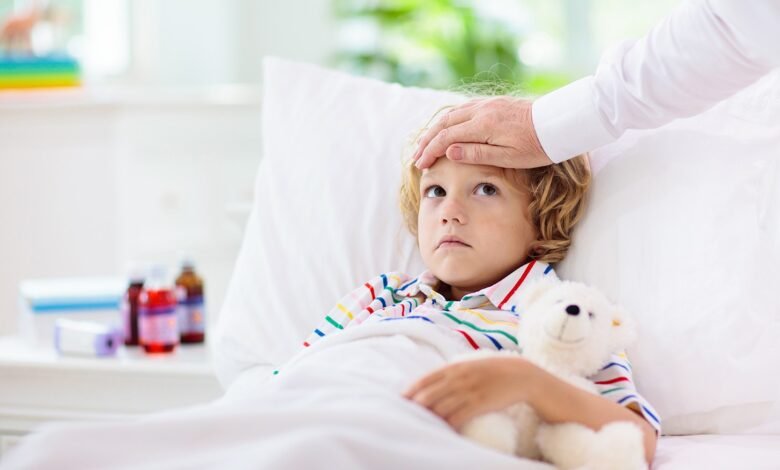Is My Child Acting Sick Or Actually Sick?

Does a child act being sick or is he faking it? Children naturally whine. They are fatigued if they are not hungry. They are bored if they aren’t exhausted. And if the sun is out and they haven’t finished their schoolwork, they are way too sick to go to school.
It’s not unusual for kids to make up illnesses. It has existed since, uh, before you were a young child making up an ailment. However, given the prevalence of COVID-19, the flu, and other respiratory ailments, sometimes it might be difficult to understand what they are saying when they do so. No parent wants to overlook something important. How do you tell if a youngster is being sincere when they complain?
Read More: 5 Tips for Preventing a Cold
Telltale indicators, according to Dr. Ahmad Bailony, a board-certified pediatrician associated with Sharp Chula Vista Medical Center, would be if the patient’s complaints didn’t match the symptoms. “Does your youngster cough in the morning but not the rest of the day? Do they get stomach aches yet continue to eat and drink without any problems?
When interpreting their child, most parents rely on their instincts. But according to Dr. Bailony, many people struggle with these four types, endearing behaviors:
4 typical, endearing behavior
My stomach hurts.
Symptoms of a real stomachache include low appetite, diarrhea, vomiting, or constipation. Ask your child for more details to identify the issue if none of these are present.
I got a headache.
Since they rarely coincide with physical findings, headaches are difficult to confirm. It may be a migraine and your child needs to rest if they complain of hazy vision or eye pain, though. To rule out meningitis in children who have a stiff neck, headache, and fever, consult a doctor straight away. If the headache is accompanied by vomiting, consult your child’s doctor as well.
That area of my body hurts
Verify the questioned body component. Is the touchable surface soft? Are there any redness or swells? In that case, take this issue seriously. Fever and other unusual symptoms should also be watched out for.
I think I’m going to puke
True motion sickness in children generally results in vomiting. However, a number of factors, such as consuming too many sweets or taking a long vehicle ride, can result in momentary nausea. Contact their doctor if your child continues to have nausea without vomiting.
The genuine thing
Despite intuition, there are several illnesses that parents should never overlook. According to Dr. Bailony, parents should seek medical attention right once if their child encounters:
Fever
A temperature of 100 degrees Fahrenheit or greater is considered a fever. Most schools require kids to wait 24 hours without taking any sort of fever-relieving medication before they can go back to class.
Nausea Or Diarrhea
If these signs appear just once, keep an eye on your child the rest of the day. Keep them at home and consult your child’s doctor if vomiting or diarrhea occur twice in one day.
A Skin Rash
Before going back to school, your child should consult a doctor if their rash contains pus or fluid. The presence of a fever along with the rash may indicate the presence of a contagious illness like the measles or chicken pox.
Eye Color
There are numerous factors that can irritate your child’s eyes, including.
Scabies Or Head Lice
Professional help is necessary for scabies (caused by mites) and head lice (caused by parasites). Watch out for rashes, blisters, itchy scalp, or sores on the hands or feet.
Dr. Bailony explains, “In the end, we don’t expect parents to be medical specialists.” Have your child evaluated by your pediatrician if they are complaining of symptoms but you are unable to explain them.
Read More: 4 Life-Changing Benefits of Drinking More Water
Keeping Children’s Health
Want assistance with staying healthy in the first place? While there aren’t vaccines for every conceivable disease, COVID-19 and flu shots are both secure and reliable options. Experts advise parents and children to get immunized since COVID and influenza cases are on the rise. To get both immunizations, consult your child’s doctor, go to your neighborhood pharmacy, or go to a community vaccine clinic.
Furthermore, germs spread when we interact with sick individuals, go out in public when ill, or touch an infected surface before putting our hands close to our eyes, nose, or mouth. Regular hand washing and being at home while ill are crucial steps to prevent the spread of infectious diseases.
Diagnosis: They Are Lying
What transpires then when the diagnosis is a tried-and-true forgery?
Talk to your child first about their reasons for not wanting to attend school. They can be having trouble with a classmate or feeling overburdened by an assignment. Have an honest discussion, advises Dr. Bailony. “Prove to them that you support them. Keeping the lines of communication open will enable you to see the wider picture. Children want to feel supported and cared for.







